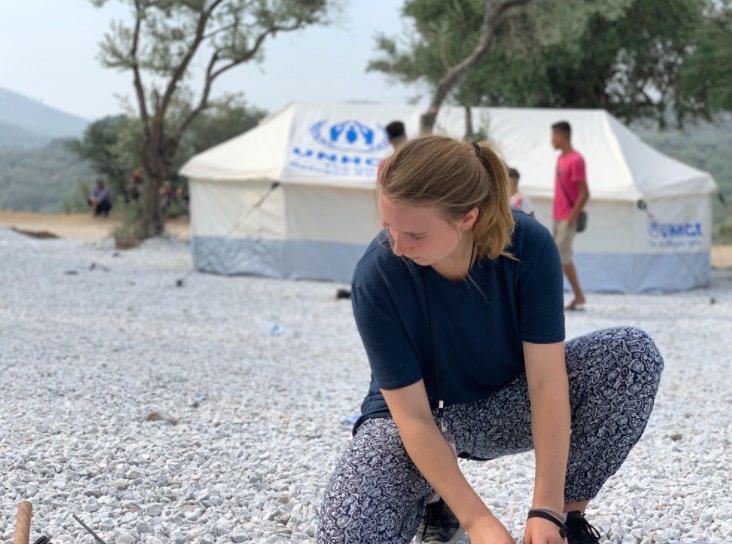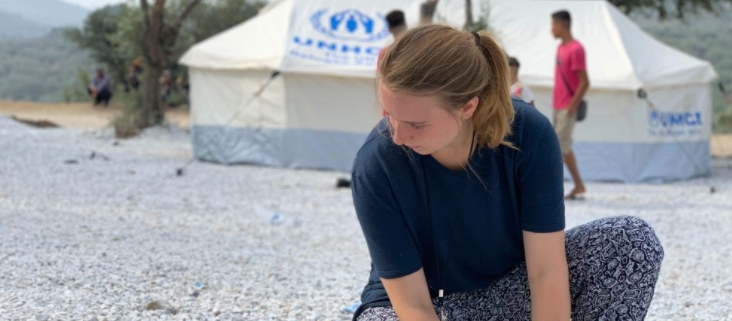Frontida Records helps create healthcare record system in Greece

Traveling to Lesbos, Greece last February to help provide refugees with more viable shelter conditions for her “Innovation in Engineering and Design for Global Challenges” course group project, Lauren Yen saw how many refugee camps struggled with the current system of maintaining health documentation, leading to misdiagnosis and difficult-to-process medical information.
Yen, a senior majoring in biological sciences, said she spoke with Radwan Faashtol, one of the camp’s clinicians, and that together they discovered issues with documentation records and its paper-based system, such as maintaining accurate records and sharing medical information within the camp.
“Everything was done unconnected so people would have their own papers stashed away,” Yen said, adding that the refugees were unable to access their information.
Following travel restrictions and worldwide government lockdowns, Yen and her classmates returned to the United States early-March. With underserved refugees at risk of catching the disease, the pandemic also further emphasized the need for an electronic system in camp medical clinics to address the needs of their patients, according to the Frontida Records website.
In response to the camp’s records situation, Yen, along with a group of Viterbi School of Engineering students, established Frontida Records, a nonprofit startup organization designed to create a modular, cloud-based health documentation system to serve patients and clinicians. Frontida Records, conceived last March, provides patient portals for Greek residents to access medical records on mobile and track diseases and outbreaks in their region.
The nonprofit, which currently functions as a beta test in Greece, consists of 13 listed members, and is supported by Viterbi faculty and students, and has partnered with two organizations: Crisis Management Association, Greece and Floating Doctors, Panama.
After returning from Lesbos, Yen collaborated with now co-founder Laura Roed and a team of engineers, businesspeople and fundraisers to create a more digital record system. After being sent home from campus, the planning behind Frontida Records pivoted online. Working alongside Faashtol, Yen and Roed collaborated to ensure that Frontida Records established a digital record system.
Roed, a senior in the Iovine and Young Academy, researched different electronic health record systems with Yen. Within two months, Roed and Yen concluded their design of the system and recruited engineers to help build the app from scratch.
“You have no idea, when you start working on an app, how complicated it really is, because it’s like, ‘Oh, it’s only going to be five pages,’” Roed said. “Then it turns out it’s actually going to be 20 pages, because there’s all of these intermediary things that you need to do.”
Along with preventing the team from coming together, the pandemic also influenced the design software created by the engineering team, as the software had to adapt to changes the pandemic brought along. Team engineer Kristof Osswald said they had to develop a triage system — a system that determines the level of care a patient should receive. He said it was a slow process that involved eight people volunteering their time.
Osswald also said the team explored a series of low code options and no code options as a way to keep up with the changing conditions of the environment in the refugee camps. In other words, the applications can be altered with minimal knowledge of coding.
As a startup working with personal patient data, Frontida Records also needed to comply with data regulation and human rights laws, including the General Data Protection Regulation and the Health Insurance and Portability and Accountability Act. Complying with laws and regulations allowed the organization to provide the highest quality service, Yen said.
“It takes quite fastidious care to ensure that what we’re doing is compliant,” Yen said. “A lot of our team members did spend a lot of time investing in understanding GDPR, running through many, many pages of GDPR and HIPAA to truly understand, in addition to having interviews with people [to advise us] … we’re also trying to get our systems checked by experts in the field. So we’re trying to give the highest quality care as well as the safest quality care possible with our due diligence.”
Setting up Frontida Records required communication from teammates across the United States and the world, including China and areas with 10-hour time differences according to Quincy Guenther, who operates the business and strategy side of Frontida Records. Despite the challenge of communicating between different time zones, the struggle was worth it, Yen said.
“This isn’t like a seasoned team of seasoned veterans in terms of [electronic health records collection], development and design and all that kind of stuff,” said Guenther, a senior majoring in neuroscience. “We’re learning as fast as we can, testing things as fast as we can and trying to iterate so that we can build a great thing for them.”
After officially launching the app in October, the startup received suggestions from clinicians to fix user errors and add features for both creating schedules and sorting patients. Since adding those features, reception has been positive, with clinicians able to process patients more easily.
“Every week for like two months, we were able to keep iterating on the product and keep improving it,” Roed said. “It got to the point where we don’t get that much feedback now because they’re just using it, they’re happy with it.
Following the organization’s success, Frontida Records has been entered into various competitions including NAE COVID-19 Call for Engineering Action, SLINGSHOT 2020 COVID-19 Challenge and Maseeh Entrepreneurship Prize Competition.
Yen said the organization has possible plans to expand to other regions, such as South America and the Caribbean, and train others to use the systems they have created. Members of the team said they appreciate their experience and part in Frontida Records.
“It’s not just another coding project or something you’re doing for a class,” Osswald said. “It’s actually getting into the hands of people who can really use it. You’re getting to actually be a part of what they’re trying to do.”

